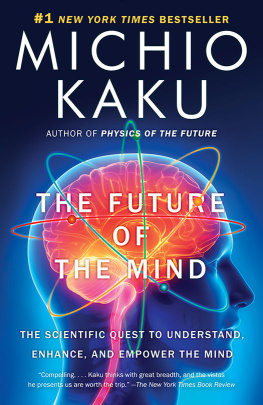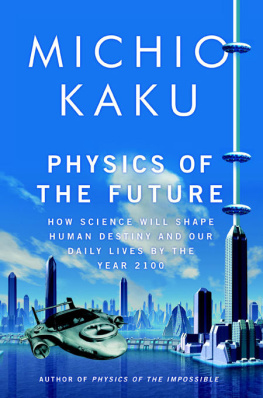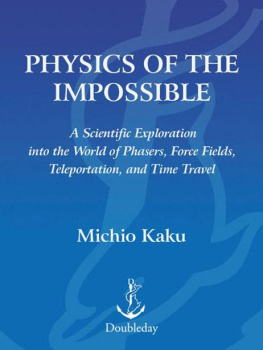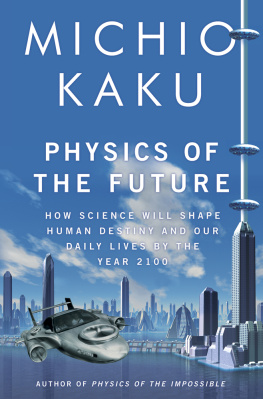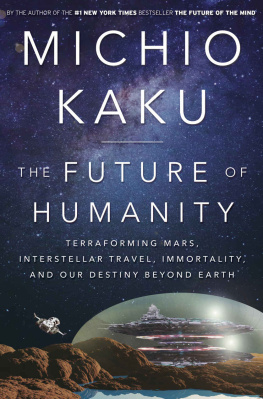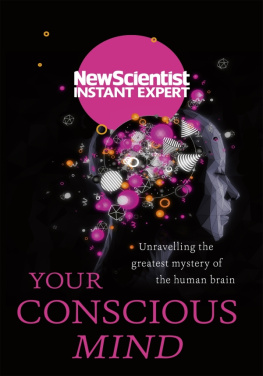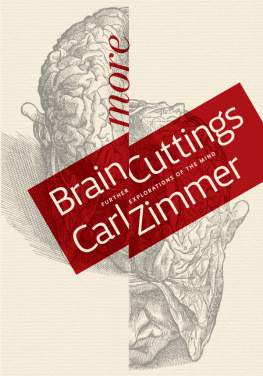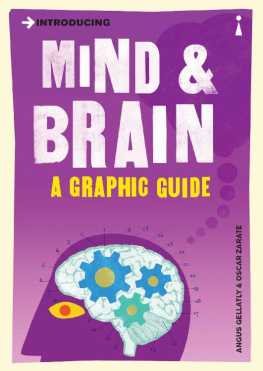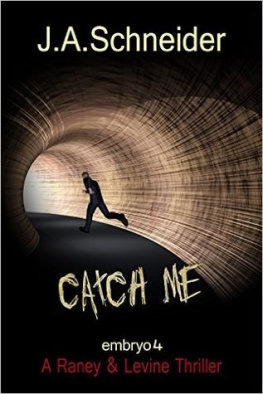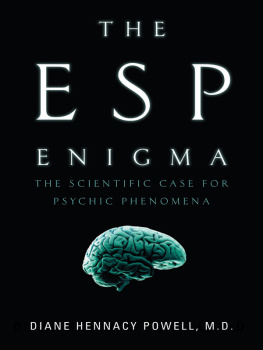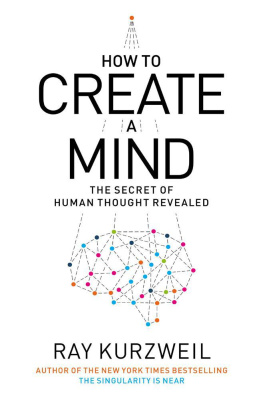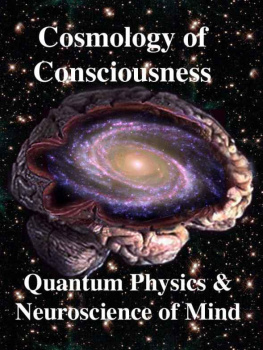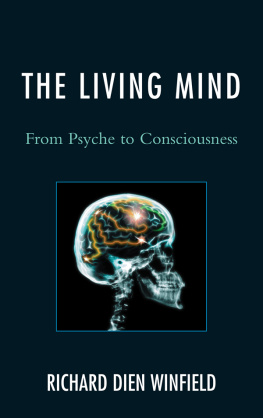Copyright 2014 by Michio Kaku
All rights reserved. Published in the United States by Doubleday, a division of Random House, LLC, New York, and in Canada by Random House of Canada Limited, Toronto, Penguin Random House companies.
www.doubleday.com
DOUBLEDAY and the portrayal of an anchor with a dolphin are registered trademarks of Random House, LLC.
Illustrations by Jeffrey L. Ward
Cover design by Michael J. Windsor
Cover illustration CLIPAREA/Custom media/Shutterstock
LIBRARY OF CONGRESS CATALOGING-IN-PUBLICATION DATA
Kaku, Michio.
The future of the mind : the scientific quest to understand, enhance, and empower the mind / Dr. Michio Kaku, professor of Theoretical Physics, City University of New York. First edition.
pages cm
Includes bibliographical references.
1. Neuropsychology. 2. Mind and bodyResearch.
3. BrainMathematical models. 4. Cognitive neuroscience.
5. Brain-computer interfaces. I. Title.
QP 360. K 325 2014
612.8dc23
2013017338
ISBN 978-0-385-53082-8 (hardcover) ISBN 978-0-385-53083-5 (eBook)
v3.1_r3
This book is dedicated to my loving wife, Shizue,
and my daughters, Michelle and Alyson
CONTENTS
ACKNOWLEDGMENTS
It has been my great pleasure to have interviewed and interacted with the following prominent scientists, all of them leaders in their fields. I would like to thank them for graciously giving up their time for interviews and discussions about the future of science. They have given me guidance and inspiration, as well as a firm foundation in their respective fields.
I would like to thank these pioneers and trailblazers, especially those who have agreed to appear on my TV specials for the BBC, Discovery, and Science TV channels, and also on my national radio shows, Science Fantastic and Explorations.
Peter Doherty, Nobel laureate, St. Jude Childrens Research Hospital
Gerald Edelman, Nobel laureate, Scripps Research Institute
Leon Lederman, Nobel laureate, Illinois Institute of Technology
Murray Gell-Mann, Nobel laureate, Santa Fe Institute and Cal Tech
the late Henry Kendall, Nobel laureate, MIT
Walter Gilbert, Nobel laureate, Harvard University
David Gross, Nobel laureate, Kavli Institute for Theoretical Physics
Joseph Rotblat, Nobel laureate, St. Bartholomews Hospital
Yoichiro Nambu, Nobel laureate, University of Chicago
Steven Weinberg, Nobel laureate, University of Texas at Austin
Frank Wilczek, Nobel laureate, MIT
...
Amir Aczel, author of Uranium Wars
Buzz Aldrin, NASA astronaut, second man to walk on the moon
Geoff Andersen, U.S. Air Force Academy, author of The Telescope
Jay Barbree, author of Moon Shot
John Barrow, physicist, Cambridge University, author of Impossibility
Marcia Bartusiak, author of Einsteins Unfinished Symphony
Jim Bell, Cornell University astronomer
Jeffrey Bennet, author of Beyond UFOs
Bob Berman, astronomer, author The Secrets of the Night Sky
Leslie Biesecker, National Institutes of Health
Piers Bizony, author of How to Build Your Own Starship
Michael Blaese, National Institutes of Health
Alex Boese, founder of Museum of Hoaxes
Nick Bostrom, transhumanist, Oxford University
Lt. Col. Robert Bowman, Institute for Space and Security Studies
Cynthia Breazeal, artificial intelligence, MIT Media Lab
Lawrence Brody, National Institutes of Health
Rodney Brooks, director of the MIT Artificial Intelligence Laboratory
Lester Brown, Earth Policy Institute
Michael Brown, astronomer, Cal Tech
James Canton, author of The Extreme Future
Arthur Caplan, director of the Center for Bioethics at the University of Pennsylvania
Fritjof Capra, author of The Science of Leonardo
Sean Carroll, cosmologist, Cal Tech
Andrew Chaikin, author of A Man on the Moon
Leroy Chiao, NASA astronaut
Eric Chivian, International Physicians for the Prevention of Nuclear War
Deepak Chopra, author of Super Brain
George Church, director of Harvards Center for Computational Genetics
Thomas Cochran, physicist, Natural Resources Defense Council
Christopher Cokinos, astronomer, author of Fallen Sky
Francis Collins, National Institutes of Health
Vicki Colvin, nanotechnologist, University of Texas
Neal Comins, author of Hazards of Space Travel
Steve Cook, NASA spokesperson
Christine Cosgrove, author of Normal at Any Cost
Steve Cousins, CEO of Willow Garage Personal Robots Program
Phillip Coyle, former assistant secretary of defense for the U.S. Defense Department
Daniel Crevier, AI, CEO of Coreco
Ken Croswell, astronomer, author of Magnificent Universe
Steven Cummer, computer science, Duke University
Mark Cutkowsky, mechanical engineering, Stanford University
Paul Davies, physicist, author of Superforce
Daniel Dennet, philosopher, Tufts University
the late Michael Dertouzos, computer science, MIT
Jared Diamond, Pulitzer Prize winner, UCLA
Marriot DiChristina, Scientific American
Peter Dilworth, MIT AI Lab
John Donoghue, creator of Braingate, Brown University
Ann Druyan, widow of Carl Sagan, Cosmos Studios
Freeman Dyson, Institute for Advanced Study, Princeton University
David Eagleman, neuroscientist, Baylor College of Medicine
John Ellis, CERN physicist
Paul Erlich, environmentalist, Stanford University
Daniel Fairbanks, author of Relics of Eden
Timothy Ferris, University of California, author of Coming of Age in the Milky Way Galaxy
Maria Finitzo, stem cell expert, Peabody Award winner
Robert Finkelstein, AI expert
Christopher Flavin, World Watch Institute
Louis Friedman, cofounder of the Planetary Society
Jack Gallant, neuroscientist, University of California at Berkeley
James Garwin, NASA chief scientist
Evelyn Gates, author of Einsteins Telescope
Michael Gazzaniga, neurologist, University of California at Santa Barbara
Jack Geiger, cofounder, Physicians for Social Responsibility
David Gelertner, computer scientist, Yale University, University of California
Neal Gershenfeld, MIT Media Lab
Daniel Gilbert, psychologist, Harvard University
Paul Gilster, author of Centauri Dreams
Rebecca Goldberg, Environmental Defense Fund
Don Goldsmith, astronomer, author of Runaway Universe
David Goodstein, assistant provost of Cal Tech
J. Richard Gott III, Princeton University, author of Time Travel in Einsteins Universe
Late Stephen Jay Gould, biologist, Harvard University
Ambassador Thomas Graham, spy satellites and intelligence gathering
John Grant, author of Corrupted Science
Eric Green, National Institutes of Health
Ronald Green, author of Babies by Design
Brian Greene, Columbia University, author of The Elegant Universe
Alan Guth, physicist, MIT, author of The Inflationary Universe
William Hanson, author of The Edge of Medicine
Leonard Hayflick, University of California at San Francisco Medical School
Donald Hillebrand, Argonne National Labs, future of the car
Frank N. von Hippel, physicist, Princeton University
Allan Hobson, psychiatrist, Harvard University

